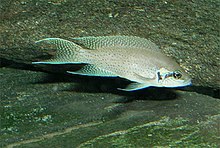| Neolamprologus | |
|---|---|

| |
| Neolamprologus brichardi from Lake Tanganyika. | |
| Scientific classification | |
| Domain: | Eukaryota |
| Kingdom: | Animalia |
| Phylum: | Chordata |
| Class: | Actinopterygii |
| Order: | Cichliformes |
| Family: | Cichlidae |
| Tribe: | Lamprologini |
| Genus: | Neolamprologus Colombé & Allgayer, 1985 |
| Type species | |
| Lamprologus tetracanthus Boulenger, 1899
| |
Neolamprologus is a genus of cichlids endemic to eastern Africa with all but one species, Neolamprologus devosi from the Malagarasi River, occurring in Lake Tanganyika. It is the largest genus of cichlids in Lake Tanganyika and also the largest genus in the tribe Lamprologini, which includes Altolamprologus, Chalinochromis, Julidochromis, Lamprologus, Lepidiolamprologus, Telmatochromis and Variabilichromis. The latter is a monotypic genus doubtfully distinct from Neolamprologus.
It is already known for some time that according to mtDNA sequence analysis, this genus is very probably polyphyletic. It is likely that it will be revised eventually; if Variabilichromis is split off, at least some of the more ancient lineages currently placed in Neolamprologus are probably worthy of separation also. However, the morphological similarity and numerous undescribed species do not make analyses easier, and as with many cichlids, recent speciation and abundant hybridization seriously confound molecular studies to the point where single-gene studies or those using only mtDNA or nDNA are essentially worthless for resolving Lamprologini phylogeny.[1]
While lineages are clearly different in their morphology, habits and ecology, gene flow between genera and species is common enough due to extremely low postzygotic isolation. Males of Neolamprologus apparently have always readily and successfully mated with females of other Lamprologini they found ready to spawn: mtDNA lineages similar to other Lamprologini genera are widely encountered in species placed in Neolamprologus. And not only do such hybrids seem to be fertile at least to a limited extent in many cases, new species often appear to originate from such interbreeding.[2]

